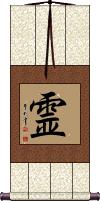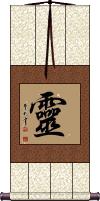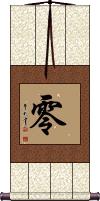Many custom options...
And formats...

Ling2 in Chinese / Japanese...
Buy a Ling2 calligraphy wall scroll here!
Personalize your custom “Ling2” project by clicking the button next to your favorite “Ling2” title below...
Rai / Rei
霊 means soul or spirit.
Sometimes 霊 can be a departed soul or ghost. 霊 is actually a Japanese variant of the Chinese character 靈 (and would be recognized in Chinese).
I titled this as Rai because 霊 was romanized as Rai and represented a fictional superhero that appeared in books published by Valiant Comics.
In Japanese, this can be the given name Rei or Tama. It can also be the Japanese surname Mitama or Tamazaki.
Spirit / Soul
靈 is spirit or soul in Chinese, Japanese Kanji, and old Korean Hanja.
If you look in the dictionary, you'll also find definitions for this character like:
quick; alert; efficacious; effective; departed soul; coffin; spiritual; energy; effective; clever.
![]() There is a modern Japanese version of this character. The button above will get you the traditional/ancient form. But, if you want the modern Japanese, click on the Kanji to the right instead.
There is a modern Japanese version of this character. The button above will get you the traditional/ancient form. But, if you want the modern Japanese, click on the Kanji to the right instead.
Zero
零 is the number zero in Chinese, Japanese Kanji, and old Korean Hanja.
零 is a strange selection for a wall scroll, so it's here mostly for reference. I guess it's OK if zero is important to you.
Note: In modern Japan and China, they will often just write a circle to represent zero in lieu of this character.
Not the results for ling2 that you were looking for?
Below are some entries from our dictionary that may match your ling2 search...
| Characters If shown, 2nd row is Simp. Chinese |
Pronunciation Romanization |
Simple Dictionary Definition |
〇 see styles |
líng ling2 ling maru まる |
More info & calligraphy: Enso - Japanese Zen Circle(1) circle (sometimes used for zero); (2) 'correct' (when marking); (3) symbol used as a placeholder (either because a number of other words could be used in that position, or because of censorship); (4) period; full stop; (5) maru mark; semivoiced sound; p-sound |
零 see styles |
líng ling2 ling rei / re れい |
More info & calligraphy: Zero(noun - becomes adjective with の) (kana only) zero; nought; (female given name) Rei |
霊 see styles |
líng ling2 ling rei / re れい |
More info & calligraphy: Rai / Reisoul; spirit; departed soul; ghost; (given name) Rei |
靈 灵 see styles |
líng ling2 ling ryō |
More info & calligraphy: Spirit / SoulSpirit, spiritual, energy, effective, clever. |
凌志 see styles |
líng zhì ling2 zhi4 ling chih ryouji / ryoji りょうじ |
More info & calligraphy: Lexus(personal name) Ryōji |
瞪羚 see styles |
dèng líng deng4 ling2 teng ling |
More info & calligraphy: Gazelle |
蜻蛉 see styles |
qīng líng qing1 ling2 ch`ing ling ching ling kagerou / kagero かげろう |
More info & calligraphy: Dragonfly(kana only) dragonfly; damselfly; (female given name) Kagerou |
通靈 通灵 see styles |
tōng líng tong1 ling2 t`ung ling tung ling |
More info & calligraphy: Psychic Energy |
鈴木 铃木 see styles |
líng mù ling2 mu4 ling mu suzuki すづき |
More info & calligraphy: Suzuki(surname) Suzuki |
靈光 灵光 see styles |
líng guāng ling2 guang1 ling kuang |
More info & calligraphy: Divine Light |
靈感 灵感 see styles |
líng gǎn ling2 gan3 ling kan reikan |
More info & calligraphy: Inspiration靈應 Spirit-response, efficacious as in response to prayer. |
靈氣 灵气 see styles |
líng qì ling2 qi4 ling ch`i ling chi reiki / reki れいき |
More info & calligraphy: ReikiReiki (healing method) |
格陵蘭 格陵兰 see styles |
gé líng lán ge2 ling2 lan2 ko ling lan |
More info & calligraphy: Greenland |
藏羚羊 see styles |
zàng líng yáng zang4 ling2 yang2 tsang ling yang |
More info & calligraphy: Tibetan antelope / Chiru |
靈活性 灵活性 see styles |
líng huó xìng ling2 huo2 xing4 ling huo hsing |
More info & calligraphy: Flexibility |
○ see styles |
líng ling2 ling |
character used in Taiwan as a substitute for a real name (like "X" in English); variant of 〇[ling2] |
伶 see styles |
líng ling2 ling rei / re れい |
(old) actor; actress; (meaningless bound form) (female given name) Rei |
凌 see styles |
líng ling2 ling rin りん |
to approach; to rise high; thick ice; to insult or maltreat (surname) Rin to overcome |
囹 see styles |
líng ling2 ling hitoya |
used in 囹圄[ling2 yu3] prison |
坽 see styles |
líng ling2 ling |
(literary) precipitous cliff; (used in place names) |
堎 see styles |
líng ling2 ling |
mound; tomb |
夌 see styles |
líng ling2 ling |
to dawdle; the name of the father of the Emperor Yao |
姈 see styles |
líng ling2 ling |
(literary) (of a woman) intelligent; (used mostly in female names) |
岭 see styles |
líng ling2 ling |
used in 岭巆|岭𫶕[ling2ying2] |
柃 see styles |
líng ling2 ling |
Eurya japonica |
櫺 棂 see styles |
líng ling2 ling |
(bound form) a (window) lattice; latticework |
欞 棂 see styles |
líng ling2 ling |
variant of 櫺|棂[ling2] |
泠 see styles |
líng ling2 ling |
sound of water flowing |
淩 see styles |
líng ling2 ling |
variant of 凌[ling2] |
玲 see styles |
líng ling2 ling reiko / reko れいこ |
(onom.) ting-a-ling (in compounds such as 玎玲 or 玲瓏|玲珑); tinkling of gem-pendants (female given name) Reiko |
Click here for more ling2 results from our dictionary
The following table may be helpful for those studying Chinese or Japanese...
| Title | Characters | Romaji (Romanized Japanese) | Various forms of Romanized Chinese | |
| Rai Rei | 霊 | rei / re | líng / ling2 / ling | |
| Spirit Soul | 靈 灵 | ryou / ryo | líng / ling2 / ling | |
| Zero | 零 零 / 〇 | rei / zero | líng / ling2 / ling | |
| In some entries above you will see that characters have different versions above and below a line. In these cases, the characters above the line are Traditional Chinese, while the ones below are Simplified Chinese. | ||||
Successful Chinese Character and Japanese Kanji calligraphy searches within the last few hours...






